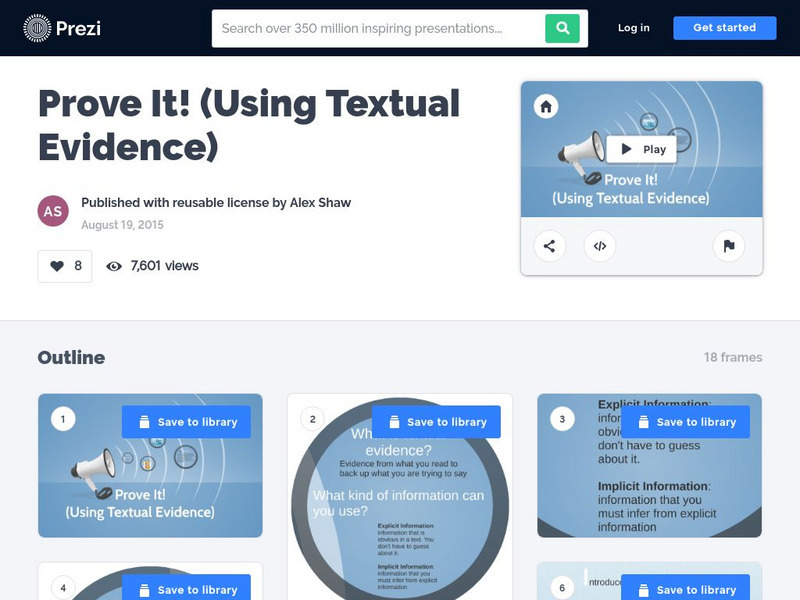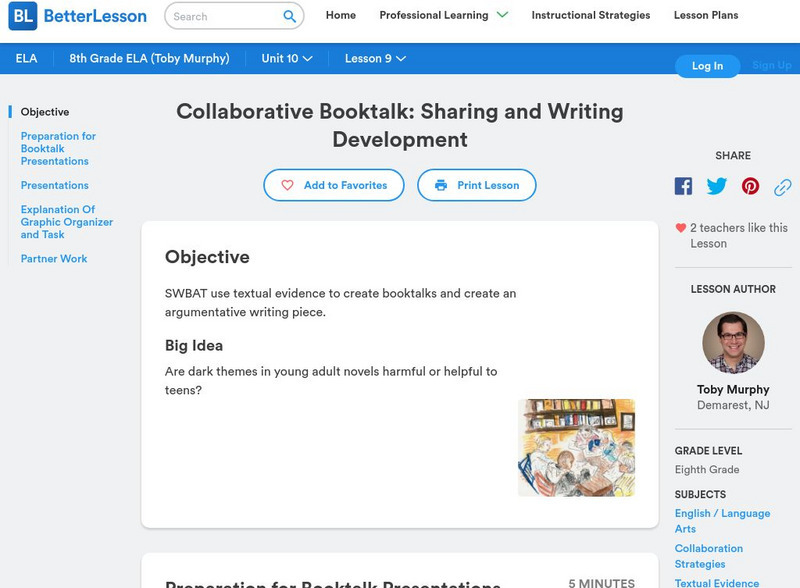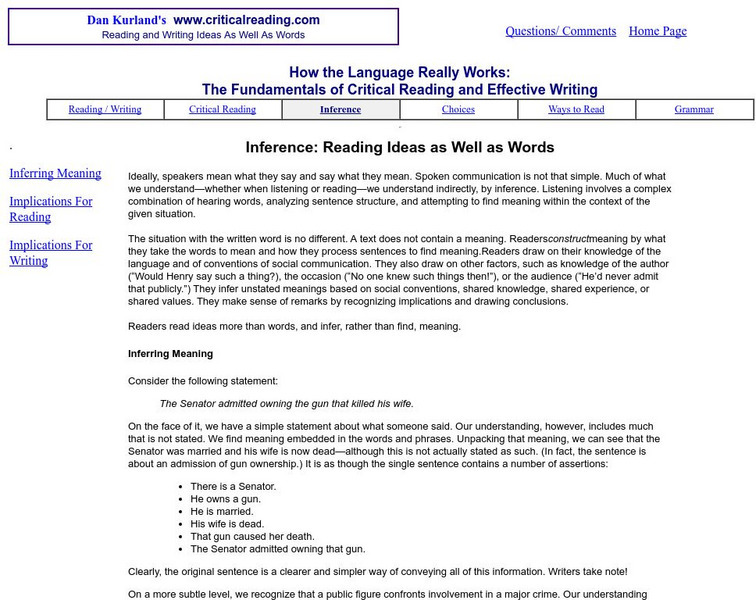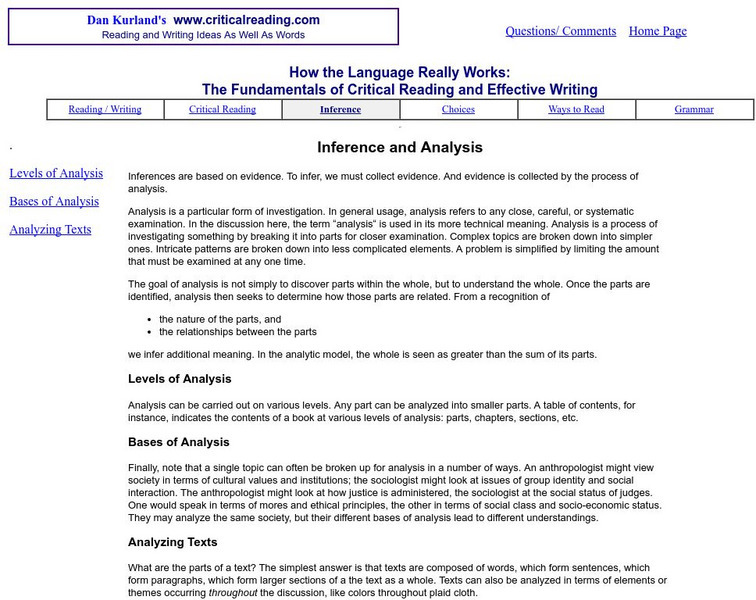Shmoop
ELA.CCSS.ELA-Literacy.SL.9-10.5
High schoolers know how to use technology, but they often need more training on how to use it effectively for educational or professional purposes. Try out the activities described here to get your pupils thinking about interesting ways...
Curated OER
The Raven
After a close reading of Edgar Allan Poe's "The Raven" individuals copy the rhythm and rhyme scheme and rewrite the final stanzas of the poem.
Curated OER
Tsunami
Learners examine the impact of tsunamis. In this tsunami lesson, students read clues and use critical thinking skills to determine why the HMS Chatham was diverted from Dubai in 2004. Learners also research tsunamis and create...
Curated OER
Folktale Quilt
Students read several selections of folktales from different historic periods and different cultures. Then they incorporate a folktale theme into a modern day story, using elements that parallel those from the original version.
Curated OER
Medieval Europe: Feudalism
Eighth graders study European society during the medieval period. They investigate the feudal social structure and how it influenced daily life. They study Japanese society during the medieval period. They compare and contrast the...
Curated OER
Analysis Through Character Action/Beliefs
Students explore characterization. In this characterization lesson, students give analytical responses to questions and determine a character's beliefs. Students use the school mission statement to develop two beliefs that the statement...
Curated OER
Heaven or Ground Hog Day?
Learners discover the ideas of enlightenment by reading historical poetry. In this philosophical lesson, students read poems by Sir Walter Scott and Sergeant Joyce Kilmer while discussing the themes of the writing with classmates....
Curated OER
Emily Dickinson: Luminous Letters
Students analyze the dimensions of Emily Dickinson's poetry and persona. For this Emily Dickinson lesson, students read the example letters and analyze a chart of the poems. Students present their findings from the poems in a presentation.
Curated OER
Race and Political Representation
Students explore different perspectives dealing with race and politics.
Curated OER
Model Lesson Plans
Ninth graders study how to identify and analyze the use of figurative language used in selected poems, short stories or other pieces of prose chosen by the teacher. These pieces of literature represent at least two pieces by one writer...
Curated OER
Interviewing the Players
Students analyze Shakespeare's words through scenes and portions of scenes. They compare the characters' motives and make connections between the text they are performing and the larger context of the play. They participate in panel...
Curated OER
Kissing Coyotes
Fourth graders are read the book "Kissing Coyotes". During the story, they make predictions about what they believe might happen next. After the story, they create their own story using their imagination and draw illustrations.
Curated OER
Cooperative Learning Groups Cooperate
Pupils apply Bloom's Taxonomy to reading selections. They prepare questions for each level of Bloom's Taxonomy and exchange them with other groups to answer. They answer another group's questions and report to one another.
Curated OER
Understanding Irony
Students discuss irony. In this language arts lesson, students identify irony and give examples of irony from their lives, a book, and current events. Students classify types of irony.
Other
Warren County Schools: Citing Textual Evidence
Well-organized and in-depth lesson on citing textual evidence and understanding inferences. Many examples are included, as well as exercises for the students to practice what they have learned. [PDF]
Thinkport Education
Thinkport: Citing Textual Evidence: Changing Oceans
Learn how to cite evidence to support ideas presented in a science article about oceans.
Other
Prezi: Prove It! (Using Textual Evidence)
Slideshow explains textual evidence and how to use the I.C.E. method when citing it.
Sophia Learning
Sophia: Critical Reading as a Learning Strategy
This tutorial focuses on critical reading using a downloadable PowerPoint presentation, "Critical Reading 101," which includes separating fact from opinion, 6 propaganda techniques, and 6 common fallacies in reasoning. Also provided is...
Texas Education Agency
Texas Gateway: Understanding Drama
You will learn how to make complex inferences in a play and use textual evidence to support your understanding.
Texas Education Agency
Texas Gateway: Themes in Literary Texts (English 6 Reading)
Learn how to infer the implicit theme in a work of fiction, distinguish theme from topic, and make complex inferences using textual evidence.
Better Lesson
Better Lesson: Collaborative Booktalk: Sharing and Writing Development
Are dark themes in young adult novels harmful or helpful to teens? Students will explore this question and will create an argumentative writing piece based on textual evidence. Videos of the lesson in action, examples of student work,...
Other
Daniel J. Kurland: Critical Reading: Inference: Reading Ideas as Well as Words
This college instructor offers his insights into critical reading and how to develop skills to interpret as well as comprehend the written word. RL.9-10.1, RL.11-12.1, RI.9-10.1 textual evidence and inference.
Thinkport Education
Thinkport: Research Simulation Task
Engage in a research process by analyzing a variety of print and non-print texts on the subject of bullying, identifying evidence regarding the topic, and using this new information to respond to questions about the text and the topic.
Other
Critical Reading: Inference and Analysis
This site defines inference and analysis. It explains how analysis works, goals of analysis, levels, bases, and how to analyze text. RL.9-10.1, RL.11-12.1, RI.9-10.1 textual evidence and inferences, RI.11-12.1 textual evidence and...























